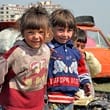BORDEAUX — Anyone visiting Italy, France, Germany or Holland this summer is likely to be struck by increasing signs of abject poverty on the streets. Begging has expanded noticeably, often by elderly men and women or mothers carrying small babies. A woman holding her three-month-old daughter asked me for loose change outside a post office the other day on Bordeaux’s most fashionable street.
At the Sunday outdoor market on Bordeaux’s revitalized riverside, an accordionist plays mournful Slavic tunes as shoppers drop coins in a cup. I chatted with him the other day in a mix of French and Russian, both of which he spoke badly. He was surprisingly cheerful and seemed well fed. Now we call each other “kamarad.”
With some exceptions, these dispossessed people are a long way from home. Eastern Europe’s poor, mostly Roma, or gypsies, are coming west in large numbers looking for a better life or at least more charity.
Since the admission of Bulgaria and Romania into the European Union two years ago they rank as the largest ethnic minority in the Union, now numbering 12 million, more numerous than the population of Belgium or Greece.
After contributing modestly to the upkeep of the Roma for some months, I felt compelled to gain entry to this off-limits culture if only to test the veracity of scare stories circulating about them. Child prostitution and rampant thievery are common complaints from the local population. Their communal way of life, their wanderlust, their rejection of contraception and their poor language skills all contribute to the barriers that exclude them.
One well-traveled friend goes further, warning me that Roma are a “permanent criminal underclass that has taken its business on the road.” The truth turns out to be more complicated.
To gain entry into their isolated quarters, I joined up with Dr. Christophe Adam of Médecins du Monde, a young physician who makes a pro bono visit to the gypsy squatters once or twice a week. On a recent visit, he was greeted as an old friend and I was just as warmly received once they came to trust me. They live in fear of racist attacks and official expulsion orders.
The doctor and I were encircled by a dozen or so men and women chattering excitedly in four languages. When they learned I was an American, one old man gave a thumbs-up sign and shouted, “Yes! Amerika!” A younger man, smiling broadly, introduced himself as “Bobby — like ‘Dallas.'”
These proud and handsome people are excluded from society where they came from — Bosnia, Serbia, Bulgaria, Romania, Hungary, the Czech Republic and Slovakia — and more so in Western Europe. Except for members of a few charitable organizations, most West Europeans treat them as lepers.
If they identify a West Europe city that treats them tolerably well, as Bordeaux does, they write to fellow-villagers back home and tell them it is safe to come over. Thus extended families are often reunited although in deplorable conditions.
After a round of introductions at the squat, Dr. Adam and I were ushered into a large room, once a factory floor that now serves as home for about 15 people. Seven double beds were neatly arranged around the room as in a military barracks. Colorful fabrics were hung to cover the cement walls. The senior woman in the group strode toward me and introduced herself in Russian as Gladka.
I half expected her to offer me tea in a glass, Russian style, but that was beyond her. The room has no running water or toilet facilities. Electricity is pirated from a nearby utility pole.
I had a long talk in halting French with Léonard, a 19-year-old Bulgarian who said he makes enough money begging and washing windshields at street corners to buy his food, so he does not have to steal to survive. “I just want a normal life for my wife, and I don’t want my daughter to become a beggar. I want to work,” he said. Another man, camping in quarters next to the Bordeaux city dump, pulled at my sleeve and begged me to help him find odd jobs.
A high-level conference in Brussels last September suggested ways to bring some order to the treatment of Roma, chiefly by recommending that Roma children be accepted in the local school system.
But the law is uncompromising. The French occasionally round up the Roma and expel them for infraction of immigration laws. The Italian police sweep through the camps to count heads and collect DNA samples to match up family members.
Some manage to escape the spiral of exclusion and degradation. One such celebrated case is Cecilia Attias, the ex-wife of French President Nicolas Sarkozy. Cecilia is the daughter of Aron Ciganer (a corruption of “tsigane,” or gypsy) who was half-Jewish and half-gypsy. Two European Parliamentarians are of Roma origin. But such success stories are rare.
Their plight is neatly summed up by Dr. Adam: “The Roma problem is symbolic of our inability to live with people whose culture and habits are outside our norms.”
























